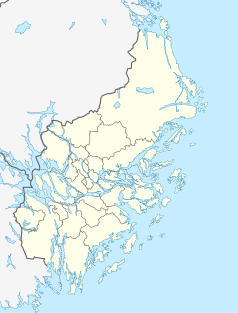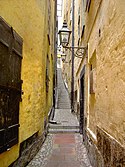Gamla stan
| ||||
| ||||
 Gamla stan, widok w kierunku północnym (luty 2013) | ||||
| Państwo | ||||
| Region | Sztokholm | |||
| Miasto | Sztokholm | |||
| Dzielnica | Södermalm | |||
| Portal | ||||
Gamla stan (Stare Miasto) – historyczna dzielnica Sztokholmu położona na wyspach: Stadsholmen, Riddarholmen, Strömsborg i Helgeandsholmen, założona w XIII wieku przez jarla Birgera. Powierzchnia dzielnicy wynosi 0,36 km² a zamieszkuje ją ok. 3 000 mieszkańców.
Znajduje się tu rokokowo-gustawiański murowany Pałac Królewski ukończony w 1754 roku. Wybudowano go po wielkim pożarze, jaki strawił większą część miasta. Podczas pobytu króla w pałacu na maszt wciągana jest flaga Szwecji.
Gamla stan połączony jest z pętlą komunikacyjną Slussen, która również posiada bogatą historię. Na terenie Slussen znajduje się loża wolnomularska, odpływają stąd również statki do Finlandii i Djurgården. Dzielnica jest dobrze skomunikowana z resztą miasta m.in. dzięki liniom metra.
Atrakcje turystyczne
- kościoły:
- Mårten Trotzigs gränd – najwęższa uliczka w mieście
- Rynek Stortorget
- budynek Poczty Królewskiej (obecnie Muzeum Poczty w Sztokholmie)
- Muzeum A. Nobla
- budynki Parlamentu szwedzkiego (Riksdag)
- Pałac Królewski
Galeria zdjęć
Widok na Gamla stan z wieży (Stadshuset)
Media użyte na tej stronie
Autor: Erik Frohne, Licencja: CC BY 3.0
Location map of Stockholm County in Sweden
Equirectangular projection, N/S stretching 197 %. Geographic limits of the map:
- N: 60.30° N
- S: 58.70° N
- W: 17.10° E
- E: 19.50° E
Autor: Koyos, Licencja: CC BY-SA 2.5
This coat of arms was drawn based on its blazon which – being a written description – is free from copyright. Any illustration conforming with the blazon of the arms is considered to be heraldically correct. Thus several different artistic interpretations of the same coat of arms can exist. The design officially used by the armiger is likely protected by copyright, in which case it cannot be used here.
Individual representations of a coat of arms, drawn from a blazon, may have a copyright belonging to the artist, but are not necessarily derivative works.
Autor: Arild Vågen, Licencja: CC BY-SA 3.0
Gamla stan (Old town), Stockholm.
Autor: Holger.Ellgaard, Licencja: CC BY-SA 3.0
Kornhamnstorg från Mariakyrkan
Autor: Mastad, Licencja: CC-BY-SA-3.0
Marten Trotzigs gränd, Gamla stan, Stockholm, Sweden












